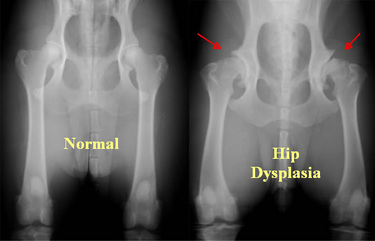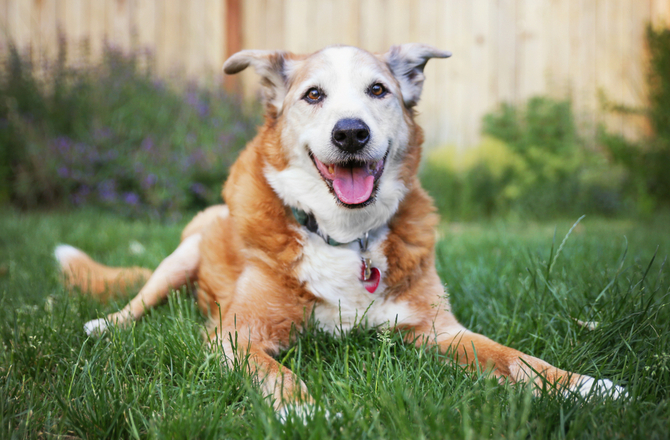Whilst we here in Brisbane are lucky enough to not feel the full artic temperature drops that our sister states suffer, it’s still starting to get cold outside. As such many of our poor pets who suffer from arthritis are certainly going to be feeling it more than normal.
Pets can show pain or discomfort in many different ways. When talking about arthritic pain, for many animals this starts out as a dull ache which many people may mistake for a loved one getting a bit older and slower. For dogs, you may notice that Fluffy is spending more time in bed, is quite stiff to get up in the mornings, slower on their walks, not wanting to go as far when out walking or a little more depressed than normal. For other pets the pain might be more severe or localised to a specific joint in which case an obvious limp may be present, scraping of the toes when walking, a wobbly gait or finding your furry friend collapsed and unable to get up. With cats their arthritis can be much more subtle as it tends to be focused more on the lower spine. You may notice that they aren’t jumping up onto the higher surfaces anymore, choosing to spend more time sleeping at home rather than going out exploring, using their front legs to pull themselves up onto the couch or walking with a crouched posture.
So what is arthritis? Arthritis, also known as osteoarthritis or degenerative joint disease, is a degenerative, progressive and irreversible condition of the joints. It is characterised by the progressive loss of cartilage, formation of boney spurs and then thickening and scarring of connective tissue around the joint. Arthritis can form secondary to a joint injury (e.g. a cruciate tear), due to abnormal wearing of the joints (e.g. elbow dysplasia, hip dysplasia, luxating patellas) due to conformational abnormalities at birth, or due to general wear and tear that occurs with time.

The good news is there are now many things that we can do to make our pets feel more comfortable and try to slow down this progressive process. Whilst we know we can’t change the disease that has occurred we can certainly make life better for them!
To diagnose arthritis your vet will start with a good history and a physical exam. On the physical exam they will watch your animal walk around, look for any limping or lameness, palpate all the muscles to assess for muscle wastage and check all the joints in the body for a reduced range of motion or pain when being manipulated.
Xrays are an excellent diagnostic tool to help us look at the joints and assess for bone changes and try to assess severity of the disease. It is important to remember that not all pets with arthritis will show obvious changes on an xray, and in some tricky to interpret regions, like the elbows, a CT scan may be required to pick up early changes. Xrays are also very important in helping us to rule out other disease processes, like bone tumours, which may mimic the same physical exam findings as arthritis but may require very different management and hold a very different prognosis.

So how can we make them feel more comfortable?
Weight management 
In arthritic animals is very important and the easiest place to start. Joints that are already sore and stressed are made worse by having to support extra weight. Numerous studies have shown that reducing a patients weight leads to a significant improvement in their quality of life and makes activities such as climbing stairs, getting from sitting to standing or getting into the car much easier. Just like in people, exercise is vital for weight loss. Feeding less food alone simply decreases the resting metabolic rate. Exercise increases the rate and thus burns more calories. One of our goals is also to increase muscle mass. Providing 20-60 minutes a day of activity along with reduced calorie intake will help patients with osteoarthritis. Obviously this needs to be tailored to the ability of your pet. If they are very painful then only a small potter for 5 minutes may be all that is initially possible. Gentle, low impact exercise is also very beneficial for stimulating the muscle mass that we need to help support the skeleton. The body has a ‘if you don’t use it, you lose it’ policy, and so if your pet is sitting stationary all the time, and not engaging their muscles they will start to waste away. At McDowall Vets we offer a FREE Wellness Club to our patients in need of weight loss. Call us to find out more.
Good nutrition
This is also essential for healthy joints. We now have several prescription diets and supplements available to help to provide the building blocks the body needs for good joint health and repair. Glucosamine increases protective joint fluid, and chondroitin helps rebuild cartilage. Many of the commercially available supplements will also contain EPA (eicosapentaenoic acid) and/or DHA (dicisagexaebiuc acid) and/or Greenlip mussel which work towards reducing inflammation within the joint. We currently recommend either 4cyte or Joint Guard. The best diets available at present are the Hills J/d, Hills metabolic/mobility or Royal Canin Mobility. The Hills metabolic/mobility is highly recommended as this covers not only joint support, but is specifically designed to also help your pet lose weight. Fish oils have also be shown to be very effective in both humans and animals where by the good omega-3 fatty acids act as a natural anti-inflammatory. All these supplements can be used as either a preventative against arthritis developing, or to help slow down the progression of arthritis. The earlier these treatments are started, the better our chances of improving long term quality of life. For many patients in the early stages of arthritis many owners will notice a marked improvement after only 3 weeks of being on these supplements. For pets with more severe arthritis it is unlikely that supplements and diet alone will make any big changes, but will at least be helping to set the body up with the best healing capacity we can.
Pentosan polysulphate sodium is a plant based compound that we use an injectable called ‘Pentosan’.
 When we have arthritis in a joint the cartilage cells are worn away exposing the nerves which becomes painful, and damages the cells that produce joint fluid (synovial fluid). These injections plump up the remaining cartilage cells so improve our cushioning factor and thicken up the joint fluid to help provide lubrication and reduce friction. We give these injections in the back of the neck but they work on all the joints in the body. When starting out we do a series of 4 injections, each 1 week apart. At the 4th injection the vet will assess the response to the injections and outline the ongoing plan for your pet. After the initial 4 week course your pet will need to return for booster injections. These vary depending on the pet – some will need monthly boosters (especially in the winter), whilst others may only need 3monthly boosters. Different brand names you may hear include ‘cartrophen’, ‘pentosan’ or ‘zydax’, but they are all the same product. Here at McDowall Vets we use Pentosan.
When we have arthritis in a joint the cartilage cells are worn away exposing the nerves which becomes painful, and damages the cells that produce joint fluid (synovial fluid). These injections plump up the remaining cartilage cells so improve our cushioning factor and thicken up the joint fluid to help provide lubrication and reduce friction. We give these injections in the back of the neck but they work on all the joints in the body. When starting out we do a series of 4 injections, each 1 week apart. At the 4th injection the vet will assess the response to the injections and outline the ongoing plan for your pet. After the initial 4 week course your pet will need to return for booster injections. These vary depending on the pet – some will need monthly boosters (especially in the winter), whilst others may only need 3monthly boosters. Different brand names you may hear include ‘cartrophen’, ‘pentosan’ or ‘zydax’, but they are all the same product. Here at McDowall Vets we use Pentosan.
Over time pets with arthritis will start to suffer from cartilage breakdown which leads to bony changes and pain and discomfort in their joints and the surrounding tissue. Non-steroidal Anti-inflammatories (NSAIDs) are designed to reduce inflammation, swelling and pain. They work very well for arthritic pain by addressing both the joint pain and the soft tissue pain. By reducing the inflammation process we are also slowing down the arthritic change process. We must be careful when using NSAIDs as one of their side effects is to worsen any underlying kidney or liver disease. For this reason, we strongly recommend a blood test prior to starting on an NSAID, and then a monitoring blood test every 12months to ensure the medication is causing no harm. It also means that we must monitor your pet and their overall clinical health more closely and so legally we must see them in for a health check every 6months to be able to continue prescribing the NSAIDs. An NSAID should be used for a minimum of 5 days to be beneficial. Your vet will work with you and your pet to work out a program as to how best to use the NSAID. For some patients, this means using it for 5 day periods whenever your pet has a ‘flare up’. For other animals, it is more beneficial to be on the NSAID daily for life, but we will try to taper the dose down to the lowest effective dose to reduce the risk of side effects. The most common NSAID that we use at McDowall Vets is oral Loxicom. It is an oral liquid that is given once daily and must either be given mixed into the food, or straight after the food. Do not give it before feeding; If given on an empty stomach we greatly increase the patients risk of gastric ulceration.

Around the home there are also several supportive things we can do to make life easier for our arthritic friends:
• Bedding – We know that cold weather aggravates arthritis and so it is important to ensure your arthritic pet is sleeping in a sheltered, warm, padded bed. When looking at bedding think about how easy it will be for your pet to step in and out of (elevated dog beds or ones with high sides may be problematic). It is also important to think about how easy the bedding will be to clean, in case of any unexpected accidents.
• Food and water bowl placement – As your pet gets more arthritic it can be harder for them to bend down to reach their bowls. Using a stand or an upturned box can help to elevate the food and water bowls and make it easier for your pet to access them!
• Floor coverings – Arthritic dogs find it harder to walk on slippery floors. Ensure your floors have good non-slippery covering such as carpet instead of tiles. You can often get quite cheap off cuts of carpet from the larger carpet shops to create little ‘runways’ throughout the home.
• Stairs – Arthritic animals have a lot of trouble getting up and down stairs. They are also at higher risk of falling down the stairs and injuring themselves further. It may be advisable to consider changing the sleeping arrangements to ensure your pet is sleeping on the ground floor of the house. A ramp may also be appropriate to help getting up and down short flights of stairs, or in and out of a car. Consider using a baby gate at the top of any stairs to prevent your friend from taking any tumbles.
In addition to medical management there are some alternative or supportive therapies that may be of benefit:
• Physiotherapy – For some patients physiotherapy can be very beneficial to help reduce muscle pain and improve mobility. When you have painful joints you can get trapped into a cycle of not wanting to move or walk because it is painful. In turn your muscles then start to waste away, giving you nothing to support your painful joints. We can work with you and your pet to devise some low impact exercises you can do at home, or refer you to see an animal physiotherapist who can carry out more specialist programs.
• Hydrobath/Swimming – Swimming is a fantastic way to help increase muscle tone and strength, and keep weight down. By removing gravity, we also remove the pressure on those poor arthritic joints and the result is a low impact, low pain exercise! A hydrobath facility will design a program specifically for your pet based on their love (or dislike) of the water and their abilities. Many facilities will be able to offer large swimming pool swimming (with life jacket) or an underwater treadmill!
• Nail trimming – As your pet becomes more arthritic the way that they walk will mean that some of their nails won’t be getting worn down properly. In time this will make walking even more painful for them, so it is important to trim your pets nails regularly.
• Acupuncture – Whilst we don’t currently offer this procedure at McDowall Vets, it is another adjunct therapy that can be beneficial to some pets in the treatment of arthritis alongside other main stream practices.
So having had a good read I would encourage you to take a look at your furry friends and see if they are exhibiting any of the subtle, or not so subtle, signs that arthritis may be present. If you do suspect they have arthritis then I encourage you to come in and speak to a vet about what we can all be doing to help to give them the best quality of life. In order to help with this, we are offering FREE arthritis checks for our patients during the month of June. Call us on 3353 6999 if you would like to take advantage of this opportunity. Arthritis is a year round problem but the cold weather exacerbates it and so this winter, keep your eyes peeled for any changes!



